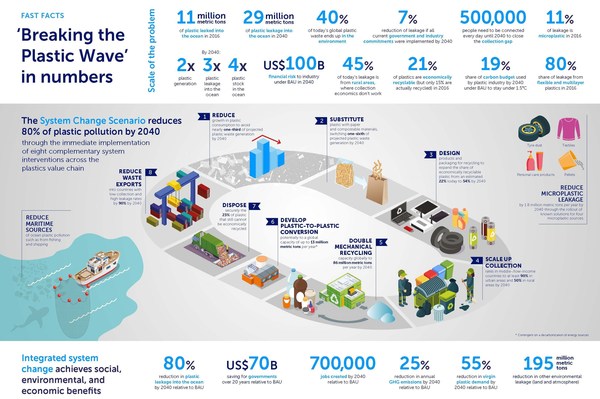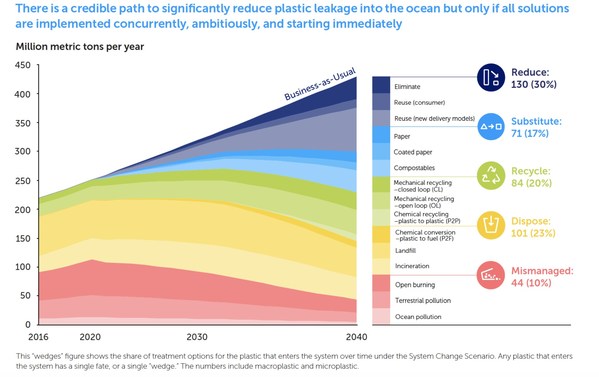Research Finds Plastic Flows Into the Ocean Expected to Triple by 2040--but Immediate Action Could Stem Tide by More Than 80%
Report lays out viable pathway to 'Break the Plastic Wave'
WASHINGTON,July24,2020 -- A new analysis by The Pew Charitable Trusts and SYSTEMIQ finds that without immediate and sustained action,the annual flow of plastic into the ocean could nearly triple by 2040. But the study also identifies solutions that could cut this volume by more than 80 per cent using technologies that are available today,if key decision-makers are willing to make systemwide changes.
The findings from the scientific analysis were released today in a report,"Breaking the Plastic Wave: A Comprehensive Assessment of Pathways Towards Stopping Ocean Plastic Pollution." The release coincides with the July 23 publication of the technical underpinnings of the report in an article in the journal Science,"Evaluating Scenarios Toward Zero Plastic Pollution."
The research found that if no action is taken to address the projected growth in plastic production and consumption,the amount of plastic entering the ocean each year would grow from 11 million metric tons to 29 million metric tons over the next 20 years,equivalent to nearly 50 kilograms (110 pounds) of plastic on each metre of coastline worldwide. Because plastic remains in the ocean for hundreds of years andmay never truly biodegrade,the cumulative amount of plastic in the ocean by 2040 could reach 600 million tons—equivalent in weight to more than 3 million blue whales. And COVID-19 has presented additional challenges in the fight to end ocean-bound plastic pollution,as single-use plastic consumption has increased during the pandemic,according to the International Solid Waste Association.
Working with scientists and experts around the world,Pew and SYSTEMIQ reached the report's conclusions using a first-of-its-kind economic model that quantifies the flow and amount of plastic in the global system and compares the quantity of ocean plastic pollution between 2016 and 2040 under six scenarios: from no change from the projected rising flow of plastic into the ocean (noted in the report as "business-as-usual") to a total overhaul (called the "system change scenario") of the world's plastics system,including its production,collection,consumption,and disposal/recycling. The model quantifies the associated cost,climate,and employment implications of each scenario.
Although progress has been made in addressing the global plastic challenge,the report finds that current commitments by government and industry will reduce the amount of plastic flowing into the ocean only by 7 per cent by 2040. And without meaningful change,about 4 billion people worldwide are likely to be without organized waste collection services by 2040,contributing significantly to the projected amount of ocean plastic pollution; closing this gap would require connecting more than 500,000 people to collection services per day until 2040.
"Breaking the Plastic Wave" identifies eight measures that together could reduce by 2040 about 80 per cent of the plastic pollution that flows into the ocean annually,using technology and solutions available today. Among them are reducing growth in plastic production and consumption,substituting some plastics with alternatives such as paper and compostable materials,designing products and packaging for recycling,expanding waste collection rates in middle- and low-income countries,increasing recycling,and reducing plastic waste exports. In addition to improving ocean health,adopting the changes outlined in the report could generate savings of $70 billion for governments by 2040,relative to business-as-usual; reduce projected annual plastic-related greenhouse gas emissions by 25 per cent; and create 700,000 jobs.
While the system change scenario reduces annual ocean plastic pollution rates by more than 80 per cent,it will take an unprecedented level of action and will still leave more than 5 million metric tons leaking into the ocean each year in 2040. Fully eliminating the flow of ocean plastic pollution will require dramatically increasing innovation and investment,with significant technological advances,new businessmodels,and a greater emphasis on research and development.
"There's no single solution to ocean plastic pollution,but through rapid and concerted action we can break the plastic wave," said Tom Dillon,Pew's vice president for environment. "As this report shows,we can invest in a future of reduced waste,better health outcomes,greater job creation,and a cleaner and more resilient environment for both people and nature."
Plastic pollution presents a unique challenge for producers and users of virgin,or new,plastics given regulatory changes,such as bans on single-use plastic items,and growing consumer concern about the impact of plastic waste in the environment. But it is also a unique opportunity for providers of new and existing materials and industries that use circular business models and reuse and refill systems,which are designed to keep products and materials in use for as long as possible.
"Our results indicate that the plastic crisis is solvable. It took a generation to create this challenge; this report shows we can solve it in one generation," said Martin Stuchtey,SYSTEMIQ's founder and managing partner. "'Breaking the Plastic Wave' leaves no viable excuse on the table; we have today all the solutions required to stem plastic flows by more than 80 per cent. What we now need is the industry and government resolve to do so."
The University of Oxford,University of Leeds,Ellen MacArthur Foundation,and Common Seas collaborated with The Pew Charitable Trusts and SYSTEMIQ to produce "Breaking the Plastic Wave." The report was also developed in partnership with a panel of 17 global experts.
Media contacts:
Brandon MacGillis,Communications Officer,The Pew Charitable Trusts bmacgillis@pewtrusts.org+1 (202) 320-9448
Sun Oh,Head of Communications,Circular Economy & Materials,SYSTEMIQ sun.oh@systemiq.earth +44 (0)7741 738095
About Pew
The Pew Charitable Trusts is driven by the power of knowledge to solve today's most challenging problems. Learn more at www.pewtrusts.org.
About SYSTEMIQ
SYSTEMIQ was founded in 2016 to drive the achievements of the Paris Agreement and the United Nations Sustainable Development Goals by transforming markets and business models in three key economic systems: land use,materials,and energy. Since 2016,SYSTEMIQ has been involved in several system change initiatives related to plastics and packaging,including the New Plastics Economy initiative (Ellen MacArthur Foundation) and Project STOP (a city partnership programme focused on eliminating plastic pollution in Indonesia),among others. At the heart of our work is the core belief that only a smart combination of policy,technology,funding,and consumer engagement can address system-level challenges. Learn more at https://www.systemiq.earth/.

Breaking the Plastic Wave - By the Numbers

There is a credible path to significantly reduce plastic flow into the ocean,but only if all solutions are implemented concurrently,ambitiously,and starting immediately.
Video - https://mma.prnewswire.com/media/1218962/BPW_digital_social_video.mp4
Photo - http://cusmail.com/res/2023/07-27/11/e16aed59ead6dda90d11a2c3aef3ebed.jpg
Photo - http://cusmail.com/res/2023/07-27/11/d43dfd1235bb36ef4cfffe67ea7cbde6.jpg